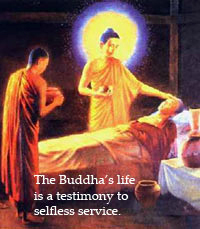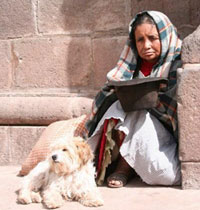To Serve with Love
By Chan Kah Yein, Ph.D
Dr. Martin Luther King once said,
“Everyone has the power of greatness; not for fame,
but greatness. Because greatness is determined by service.”
Indeed, many people go down in history for being famous (or infamous!), but the ones who touch our hearts and whom we remember fondly are those who have served selflessly.
After His Enlightenment, the Buddha too led a life of service. He travelled far and wide, teaching the Dhamma to all who would lend their ears. He helped the poor and destitute, the sick and needy, and when disciples clambered to serve Him, the Buddha was reputed to have said, "He who serves the sick and suffering serves me." When the old monk, Putigassa Tissa was all alone, dying of an incurable skin ailment, and nobody would even go near him because of the foul smell he emitted, the Buddha personally looked after him, nursed him daily, until he passed away.

How do we emulate the Buddha in his selfless service? It would be good for us to examine our intentions when we serve others. Serve not for recognition or reward. Never mind if our names are not published and our deeds are not documented anywhere. Never mind if nobody knows that we have served. We serve purely because a suffering being is in need of help. Serve for the benefit of the recipients and not for ourselves. This kind of service is one of the highest forms of dāna, and brings the greatest benefit to both the giver and the recipient.
It would also do well for us to be reminded of the teachings of Master Cheng Yen, the founder of Tzu-Chi. She taught that we must always be grateful to the needy for giving us a chance to practise generosity. Then we will serve with utmost respect, courtesy and sincerity. We see these characteristics in the exemplary service of Tzu-Chi volunteers in all their activities.
I have a friend who spends every weekend serving food to the homeless and the destitute. He and his friends would spend the morning cooking a big supply of food in time for lunch. Then, they would set up a tent in one of the slum areas in town, with tables and chairs, and serve free lunch to the homeless people. They have been doing this for several years now, and he says many of the homeless people look forward very much to this "sumptuous" lunch because for some of them, it might very well be the only proper meal they would have for the entire week. And for my friend, he is grateful for this opportunity to serve the homeless because it gives him tremendous joy knowing that he and his friends are bringing relief, cheer and happiness to those who are really in need of help.
In the Itivuttaka 26, the Buddha said, "If beings knew, as I knew, the benefits of giving and sharing, they would not eat without having shared, even if it were their last mouthful." The famous Lebanese poet, Kahlil Gibran similarly writes, "Generosity is not giving me that which I need more than you do, but it is giving me that which you need more than I do." If we are willing to part with something that we still need very much for the benefit and happiness of others, then we are moving towards selflessness.

I recall an article I read many years ago in the newspapers. A journalist was observing a beggar who lived on the street with her three children. Every day, the beggar would go out and beg for food, and whatever food she brought back would be divided into five equal portions – one for herself, three for her children and one portion for a stray dog who lived nearby. It was not their pet dog, but the beggar would never forget to feed the poor dog, no matter how little food she managed to bring back each day. She did not give the dog leftovers. She gave the dog an equal portion, just as she did her children and herself.
This story reminds me of a saying by Jack London,
"A bone to the dog is not charity. Charity is the bone shared with the dog when you are just as hungry as the dog." What the beggar did, though simple, was an act of true charity and selfless service.

